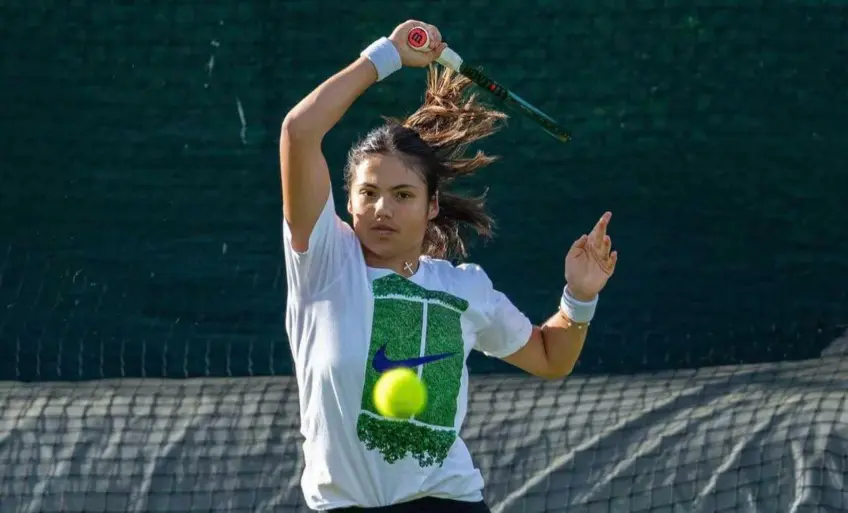
Mark Petchey, a former coach of British tennis star Emma Raducanu, has recently confirmed that while it is true that she can be a bit stubborn at times, many of the criticisms leveled against her are unwarranted. Petchey, who worked with Raducanu before her rise to fame on the WTA Tour, expressed that he thoroughly enjoyed coaching the young athlete and praised her determination and commitment to the game.
Petchey’s coaching relationship with Raducanu lasted for ten months, a formative period in her early career. At the time, she was still an unknown quantity in the world of tennis, but Petchey recognized her potential. He emphasized her strong desire to learn and her inquisitive nature, qualities that are essential for success in tennis. “In the 10 months we worked together, I was even more impressed by her application, desire, and her inquisitive nature to learn about the game,” Petchey remarked. He acknowledged that while she has a stubborn streak—an attribute he views positively in the sport—this quality is crucial for a player’s self-reliance and ability to navigate the complexities of the game.
Raducanu first burst onto the scene when she won the US Open in 2021 as a qualifier, becoming the first woman in 44 years to win a Grand Slam title without dropping a set. However, the victory also marked the beginning of a tumultuous period in her career, characterized by rapid coaching changes and a struggle to maintain consistent performance. After her historic win, Raducanu made the surprising decision to part ways with Petchey, which was just the beginning of a series of coaching changes that included stints with Nigel Sears, Andrew Richardson, Torben Beltz, Dmitry Tursunov, and Sebastian Sachs. The frequency of these changes has drawn criticism and speculation about her ability to work collaboratively and effectively within a coaching dynamic.
In response to some of the allegations that she is difficult to coach, Raducanu has defended herself, stating in interviews that there were certain questions her coaches couldn’t answer, which contributed to her decision-making process. Petchey, reflecting on his time coaching Raducanu, said, “She was one of the best players that I’ve ever had as a tennis coach, and I wish her the very best.” His comments underscore his belief in her potential and talent, suggesting that her journey, while challenging, is not unique among young athletes navigating the pressures of professional sports.
As Raducanu’s profile rose, so too did the scrutiny she faced, particularly regarding her performance and physical health. Injuries and inconsistent results led to significant media attention and public criticism. Petchey highlighted the importance of blocking out the noise from the media and public commentary, noting that many people commenting on her situation have never experienced the same level of scrutiny or pressure in their own lives or careers. He emphasized that the expectations placed on Raducanu after her US Open triumph were unprecedented. “When she won the US Open back in 2021, no blueprint or manual could explain what was going to happen in her life or career after that breakthrough moment,” he stated.
The shift in Raducanu’s career post-US Open has been complex. With numerous sponsorship offers and endorsement deals flooding in, Petchey pointed out how difficult it can be for young players to navigate such sudden changes. “When you get offers for sponsorships and endorsements as a player, it’s very hard to turn those down, especially when she was young and new to the tour. There are very few players that would have done anything differently,” he said. This commentary sheds light on the realities young athletes face as they transition into the professional arena, particularly after achieving sudden fame.
In response to the criticism she has faced, Raducanu recently stated that the noise around her performance is a byproduct of success. “I think when they’re not talking about you, that’s when you need to start to worry,” she quipped, emphasizing her awareness of the nature of public perception. Raducanu reiterated her independence and autonomy in managing her career, stating, “I’m going to do things on my own time. I’m in no rush to do anything, and everything I am doing and playing for now is for myself.”
Despite these challenges, Raducanu remains focused on her own path, prioritizing her schedule and training regime without being overly influenced by outside opinions. “I’m just enjoying it, just doing everything for myself and really just being independent out here,” she added, reinforcing her commitment to personal growth and resilience.
Recently, Raducanu faced another setback as she missed the latter part of the Asian swing due to a foot injury. However, she is expected to return to action at the Billie Jean King Cup Finals, where she will look to continue her development and find her footing in the competitive landscape of women’s tennis. As she navigates her way through these challenges, Raducanu’s journey remains one to watch, as she continues to grow both as a player and as an individual within the sport.
Leave a Reply